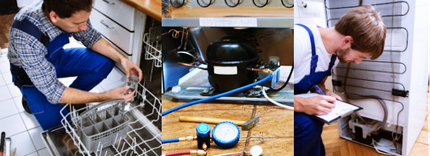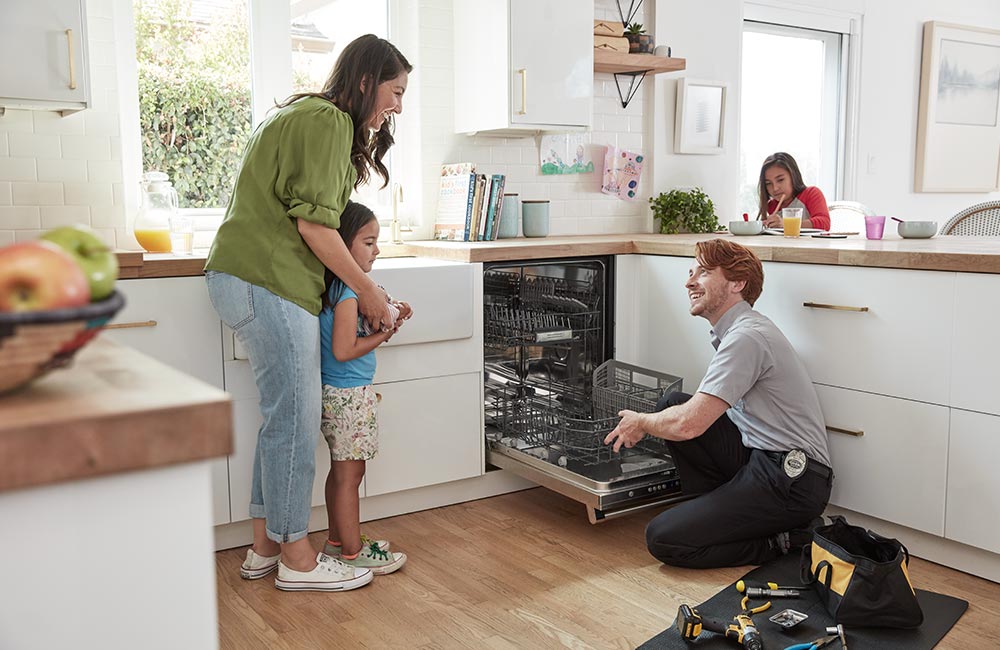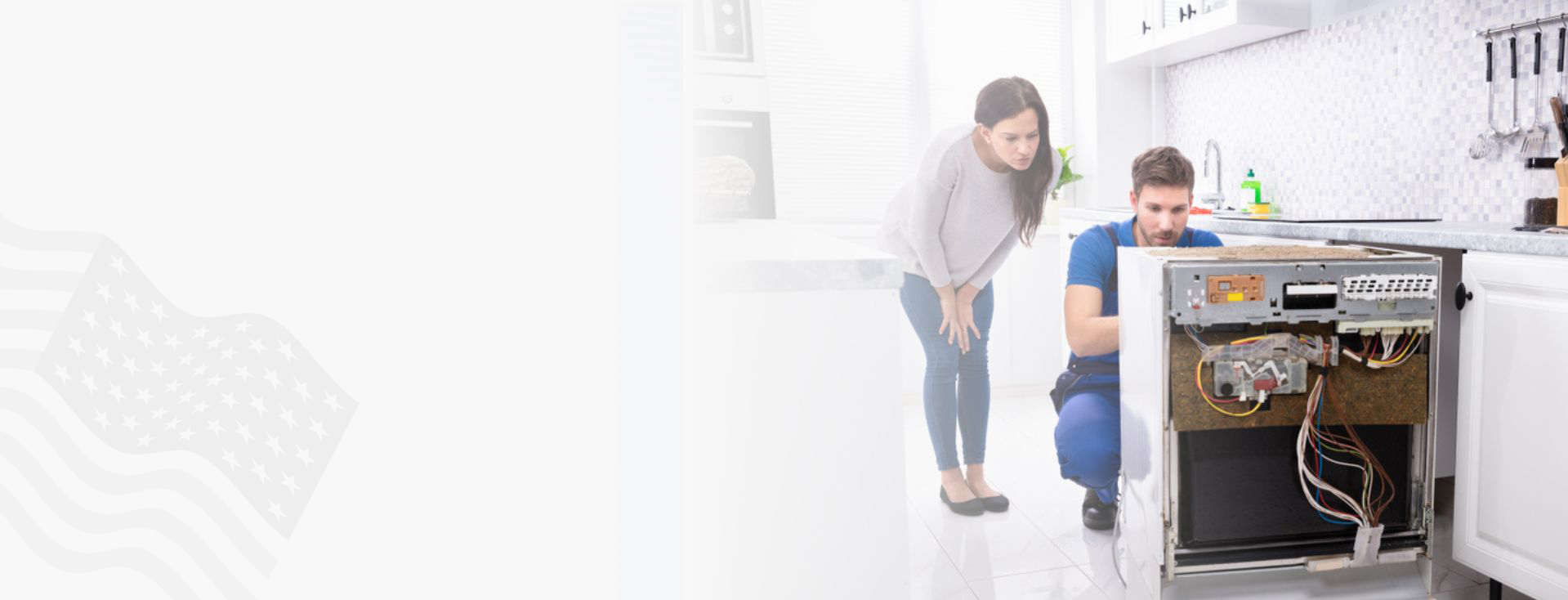The Ultimate Guide to Understanding Appliance Fixing in your home
When your fridge quits cooling down or your oven declines to warmth, it can really feel overwhelming. Comprehending appliance repair in your home can conserve you time and cash. You'll learn to identify signs and symptoms, use essential tools, and comply with a methodical troubleshooting procedure. Yet before you start, there are important safety preventative measures you require to think about. What are the most usual issues, and exactly how can you fix them? Let's discover the basics.
Common Appliance Issues and Their Signs and symptoms
When your devices begin acting up, it's necessary to recognize the signs at an early stage. Ignoring them can bring about bigger issues and pricey repair services. As an example, if your fridge isn't cooling down appropriately, you may notice cozy spots or condensation forming. This could show a falling short compressor or an obstructed vent.Your dishwasher might show troubles through dirty recipes or uncommon sounds during cycles. If you listen to grinding or clanking, it's time to investigate.A washing machine that won't rotate or drain pipes can leave you with soggy laundry, suggesting a stopped up drainpipe or a malfunctioning pump.Lastly, if your oven's temperature level seems off or it takes forever to pre-heat, you might be managing a damaged thermostat. By staying alert to these symptoms, you can address concerns prior to they rise right into significant fixings.
Necessary Tools for Home Appliance Repair
When you're tackling home appliance repair work at home, having the right tools is crucial. Basic hand devices like screwdrivers and pliers will assist you take apart and take care of various home appliances, while electric screening tools guarantee you're functioning securely with electrical wiring. Allow's review what you require to begin on your repair service trip.
Basic Hand Devices
Having the right devices is vital for efficient device repair at home. Start with a reputable screwdriver set, consisting of both flathead and Phillips kinds, as screws prevail in appliance setting up. Pliers are likewise important; they assist with gripping, twisting, and reducing cords or small elements. A set of needle-nose pliers can get to limited areas quickly. You'll need an excellent flexible wrench for tightening or loosening up nuts and screws. An utility blade is helpful for reducing via product packaging or insulation. Ultimately, don't forget a strong workbench or surface area to securely organize your tools and components. With these standard hand devices, you'll be well-prepared to tackle most appliance fixings that come your means.
Electrical Screening Tools
Along with standard hand devices, electric screening tools play an essential duty in device repair. These devices assist you diagnose electrical issues and warranty appliances operate safely. A multimeter is vital; it determines voltage, present, and resistance, enabling you to identify problems swiftly. A non-contact voltage tester is one more essential, letting you discover real-time wires without making straight contact, boosting your safety and security. Secure meters are wonderful for measuring current flow in cords without disconnecting them, saving you time and initiative. In addition, circuit testers can promptly examine if outlets are operating correctly. By utilizing these gadgets, you'll simplify your troubleshooting procedure and boost your fixing abilities, making home appliance maintenance a great deal much easier.
Step-by-Step Overview to Diagnosing Home Appliance Issues
When your device acts up, it can be discouraging, however identifying the problem does not have to be overwhelming. You'll find out to determine common issues and use efficient troubleshooting strategies. Allow's stroll with the steps to obtain your home appliance back in functioning order.
Typical Device Problems

Troubleshooting Techniques Described

Fixing Major Kitchen Area Home Appliances: A Closer Look
Have you ever before questioned how to deal with common issues with your kitchen appliances? Fixing major cooking area devices like refrigerators, ovens, and dishwashers can be much easier than you think. Begin by determining the problem-- whether it's a fridge not cooling or a stove that won't heat. Usually, a straightforward reset or checking the power resource can fix the issue.For fridges, clean the condenser coils and check the door seals. If your oven's not heating, inspect the burner and thermostat. Dishwashers may just require a tidy filter or a reset to obtain them back at work. Always disconnect the home appliance prior to diving into fixings to guarantee your safety.Don' t fail to remember to speak with the user manual for specific fixing tips associated with your model. With a little bit of perseverance and the right tools, you can confidently deal with device fixings and conserve cash in the process!

Troubleshooting Laundry Appliances: Tips and Techniques
When your laundry appliances begin acting up, it can really feel frustrating, however fixing them doesn't have to be an inconvenience. Beginning by examining the power supply. Validate the device is connected in and the outlet is working. Next, evaluate the door or cover switch; a damaged switch can stop the machine from operating.For washers, if it's not rotating, look for out of balance loads. Redistributing the clothes could address the problem. If your clothes dryer isn't heating, clean the dust filter and inspect the air vent for blockages.Listen for uncommon noises; they can indicate a problem. If your appliance is leaking, inspect the tubes for fractures or loosened links. File any type of mistake codes presented on electronic screens, as they can guide you in recognizing the issue. Consult the individual manual for details fixing ideas connected to your design.
Security Preventative Measures to Take During Repairs
Before you begin any home appliance repair work, it's vital to prioritize safety and security to avoid accidents or injuries. First, unplug the appliance or turn off the breaker to guarantee no power reaches it while you function. Use insulated devices to decrease the risk of electric shock. Wear safety goggles and gloves to shield on your own from sharp sides or debris (Dependable Refrigeration & Appliance Repair Service Dryer repair near me).Make specific your workspace is tidy and well-lit, so you can see what you're doing. Keep children and animals far from the area to prevent diversions and potential hazards. If you're handling gas devices, be extra cautious; check for leaks before proceeding.Take your time, and don't rush with fixings. If you feel unsure about any kind of action, it's far better to stop briefly and study than to guess. Complying with these precautions will certainly help create a safer atmosphere for your do it yourself home appliance repair task
When to Call a Professional for Assistance
Exactly how do you know if it's time to employ an expert for appliance repair like this work? If you've attempted standard troubleshooting without success, it's a clear indicator. For instance, if your appliance still won't start or reveals unusual noises after resetting it, don't be reluctant to additional resources look for specialist help.When you observe leaks, smoke, or shedding smells, focus on security and call a pro quickly. These problems can cause even more substantial damage or present risks to your home.Also, if your appliance is under guarantee, getting in touch with an expert is frequently the most effective course. They can guarantee that fixings will not invalidate your guarantee, conserving you money in the lengthy run.Finally, if you're unclear or awkward with complicated repair work, it's a good idea to leave it to the specialists. Bear in mind, taking on complex problems without the right proficiency can cause costly errors. Count on an expert when in uncertainty!
Often Asked Questions
Exactly How Can I Protect Against Appliance Problems in the Future?
To avoid appliance problems in the future, you must do routine upkeep, check for deterioration, tidy filters, and stay clear of overloading. Staying proactive will help prolong their life expectancy and maintain them running smoothly.
What Are one of the most Common Do It Yourself Device Repair Work Mistakes?
You could overlook safety precautions, skip repairing actions, or use incorrect devices when trying DIY appliance fixings. Hurrying the procedure or neglecting supplier guidelines can bring about even more considerable issues and pricey blunders. Keep patient and notified!
Exactly how Do I Know if a Part Demands Replacement?
You can inform if a part needs substitute by looking for unusual sounds, leaks, or irregular performance. If the home appliance battles to operate properly or shows noticeable damage, it's likely time for a replacement.
Can I Use Generic Parts for Device Fixes?
Yes, you can use generic parts for home appliance repairs, however ascertain they work - Dependable Refrigeration & Appliance Repair Service Washer repair near me. Common parts may conserve you money, yet they might impact efficiency or long life, so evaluate your alternatives thoroughly prior to making a decision
What Warranties Cover Device Repairs?
A lot of home appliance warranties cover repair services for manufacturing issues, but they frequently leave out damage from abuse. Check your guarantee terms very carefully, as some could require using licensed professionals and original components for protection to remain legitimate.